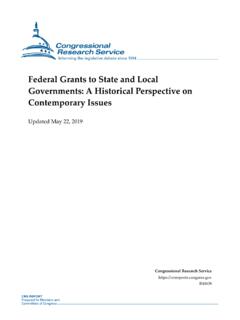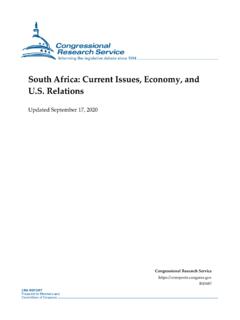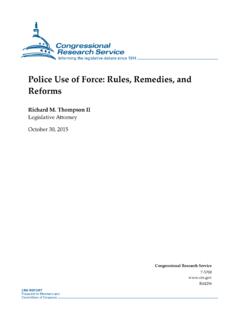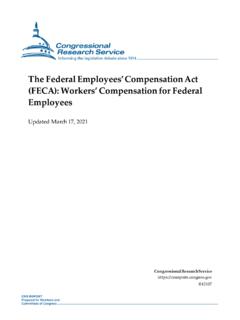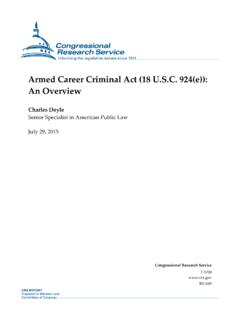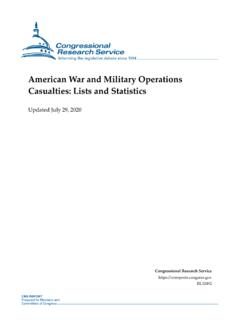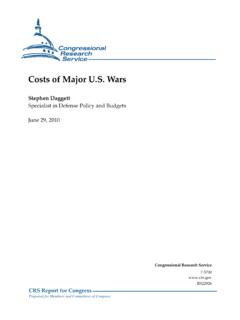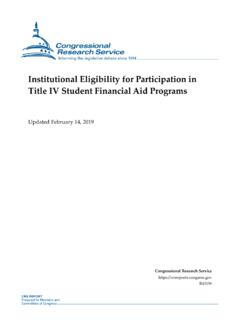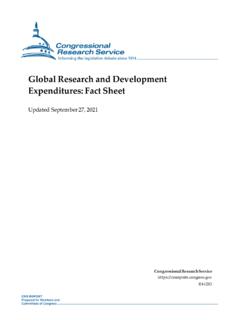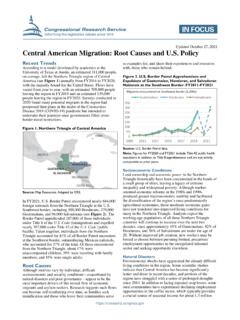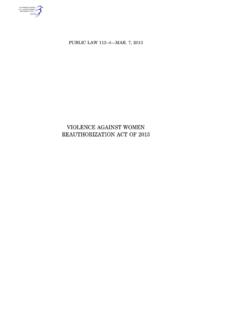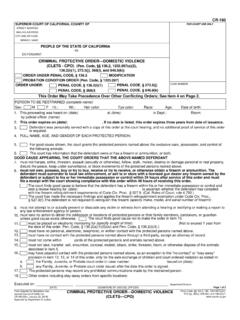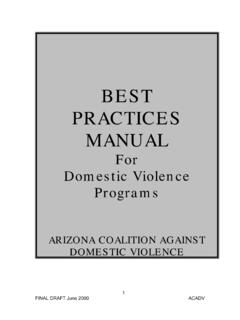Transcription of Tribal Jurisdiction over Nonmembers: A Legal Overview
1 Tribal Jurisdiction over nonmembers : A Legal Overview Jane M. Smith Legislative Attorney November 26, 2013 Congressional Research Service 7-5700 R43324 Tribal Jurisdiction over nonmembers : A Legal Overview Congressional Research Service Summary Indian tribes are quasi-sovereign entities that enjoy all the sovereign powers that are not divested by Congress or inconsistent with the tribes dependence on the United States. As a general rule, this means that Indian tribes cannot exercise criminal or civil Jurisdiction over nonmembers . There are two exceptions to this rule for criminal Jurisdiction . First, tribes may exercise criminal Jurisdiction over nonmember Indians. Second, tribes may try non-Indians who commit dating and domestic violence crimes against Indians within the tribes jurisdictions provided the non-Indians have sufficient ties to the tribes. There are three exceptions to this rule for civil Jurisdiction . First, tribes may exercise Jurisdiction over nonmembers who enter consensual relationships with the tribe or its members.
2 Second, tribes may exercise Jurisdiction over nonmembers within a reservation when the nonmember s conduct threatens or has some direct effect on the political integrity, the economic security, or the health or welfare of the tribe. These first two exceptions, enunciated in the case of Montana v. United States, are based on the tribes inherent sovereignty, and exercises of Jurisdiction under them must relate to a tribe s right to self-government. Third, Indian tribes may exercise Jurisdiction over nonmembers when Congress authorizes them to do so. Congress may delegate federal authority to the tribes, or re-vest the tribes with inherent sovereign authority that they had lost previously. Indian tribes may also exercise Jurisdiction over nonmembers under their power to exclude persons from Tribal property. However, it is not clear whether the power to exclude is independent of the Montana exceptions. The question of a tribe s Jurisdiction over nonmembers can be very complex. It is fair to say, however, that Tribal Jurisdiction over non-Indians is quite limited.
3 Tribal Jurisdiction over nonmember Indians is more extensive. Federal courts, however, consistently require nonmember defendants to challenge Tribal court Jurisdiction in Tribal court before pursuing relief in federal court. Tribal Jurisdiction over nonmembers : A Legal Overview Congressional Research Service Contents Introduction .. 1 Criminal Jurisdiction .. 2 over Non-Indians .. 2 over Nonmember Indians .. 4 Civil Jurisdiction .. 5 The Montana Exceptions .. 6 Consensual Relationships .. 6 Threat to the Tribe s Integrity .. 8 The Power to Exclude .. 10 Statutory Exceptions .. 11 nonmembers Must First Challenge Tribal Court Jurisdiction in Tribal Court .. 12 Conclusion .. 12 Contacts Author Contact 13 Tribal Jurisdiction over nonmembers : A Legal Overview Congressional Research Service 1 Introduction Originally, Indian tribes exercised sovereign authority over their territory and the all people within it, including However, Indian tribes lost some of that authority by ceding their lands to the United States and announcing their dependence on the Federal Government.
4 2 Indian tribes are prohibited from exercising both those powers of autonomous states that are expressly terminated by Congress and those powers inconsistent with their status. 3 Express termination of a tribe s sovereign authority may be found in treaties and statutes. As to sovereign authority lost by virtue of the tribes status, the Supreme Court has explained, [t]he areas in which such implicit divestiture of sovereignty has been held to have occurred are those involving the relations between an Indian tribe and non-members of the tribe. 4 By virtue of their dependent status, therefore, tribes have lost the sovereign authority to determine their relations with Accordingly, in Oliphant v. Suquamish, the Supreme Court held that Indian tribes do not have inherent sovereign authority to try non-Indian criminal defendants,6 and in Montana v. United States, the Supreme Court announced the general rule for civil Jurisdiction that the inherent sovereign powers of an Indian tribe do not extend to the activities of non-members of the tribe.
5 7 Immediately after announcing this rule for civil Jurisdiction in Montana, however, the Court identified two exceptions, known as the Montana exceptions: To be sure, Indian tribes retain inherent sovereign power to exercise some forms of civil Jurisdiction over non-Indians on their reservations, even on non-Indian fee lands. A tribe may regulate, through taxation, licensing, or other means, the activities of non-members who enter consensual relationships with the tribe or its members, through commercial dealing, contracts, leases, or other arrangements. A tribe may also retain inherent power to exercise civil authority over the conduct of non-Indians on fee land within its reservation when that conduct threatens or has some direct effect on the political integrity, the economic security, or the health or welfare of the In order to fit within one of these exceptions, nonmember conduct must somehow impinge on a tribe s inherent authority to govern itself and its The Supreme Court has identified the tribes right as landowners to exclude nonmembers from Tribal land as one of the bases for upholding Tribal taxes against nonmembers activities on Tribal 1 See Duro v.
6 Reina, 495 676, 685 (1990) ( A basic attribute of full territorial sovereignty is the power to enforce laws against all who come within the sovereign s territory, whether citizens or aliens. Oliphant [v. Suquamish] recognized that tribes can no longer be described as sovereigns in this sense. ). 2 Oliphant v. Suquamish, 435 191, 208 (1978). 3 Id. (emphasis in original; internal quotations omitted). 4 United States v. Wheeler, 435 313, 326 (1978). 5 Id. This is not an absolute rule. This report discusses the limited exceptions to it at pages 4-10. 6 435 191 (1978). 7 450 544, 565 (1981). In Montana, the Court considered whether the Tribe had Jurisdiction to enforce its hunting regulations against nonmembers hunting on non-Indian fee land located within the Tribe s reservation. 8 Id. at 565-566. 9 Nevada v. Hicks, 533 , 353, 361 (2001) ( Tribal assertion of regulatory authority over non-members must be connected to that right of the Indians to make their own laws and be governed by them.)
7 Tribal Jurisdiction over nonmembers : A Legal Overview Congressional Research Service 2 It is unclear, however whether the power to exclude is independent of the Montana Tribes may also exercise Jurisdiction over nonmembers when Congress authorizes them to do so. Congress has provided for Tribal authority over nonmembers related to the sale of alcohol on reservations, enforcement of Tribal hunting and fishing ordinances on reservations, and enforcement of certain environmental statutes. Although Tribal Jurisdiction over nonmembers is fairly limited, if a nonmember defendant in Tribal court believes the court lacks Jurisdiction , he or she must first challenge the Jurisdiction in Tribal Only after exhausting the Tribal court remedies may the nonmember get relief in federal court. Criminal Jurisdiction In most cases, Tribal criminal Jurisdiction over non-Indian offenders is clear as a general rule, Indian tribes do not have it. However, there is an exception for tribes to exercise criminal Jurisdiction over non-Indians who commit dating and domestic violence against Indians within a tribe s Jurisdiction , provided the non-Indian has sufficient ties to the tribe and the tribe provides certain rights.
8 Tribal criminal Jurisdiction over nonmember Indians is more difficult to discern. Such Jurisdiction depends on whether the nonmember Indian is recognized as an Indian by the federal government or the Tribal community. This determination turns on factors such as enrollment in a tribe; the degree to which the nonmember Indian has received federal services and benefits for Indians; benefited from Tribal rights or services; and participated in Tribal ceremonies and social life. over Non-Indians In Oliphant v. Suquamish Indian Tribe, the Court held that tribes lack inherent sovereign authority over non-Indian The Court first analyzed the history of criminal Jurisdiction over non-Indians within Indian country through treaty provisions, executive branch activities and opinions, and lower court opinions, and concluded that historically the legislative and executive branches and lower courts presumed that Indian tribes did not have authority over non-Indians who committed offenses within Indian Although the Court wrote that this history was not conclusive, it determined that it carries considerable weight.
9 15 Accordingly, the Court read the Suquamish Tribe s (Tribe s) treaty with the United States in light of the historical presumption against Tribal Jurisdiction over non-Indian The Court acknowledged that 10 Merrion v. Jicarrilla Apache Tribe, 455 130 (1982). 11 Atkinson Trading Co. v. Shirley, 532 645 (2001). 12 Iowa Mutual Insurance Co. v. LaPlante, 480 9 (1987); National Farmers Union Insurance Cos. v. Crow Tribe of Indians, 471 845 (1985). 13 435 191 (1978). 14 Id. at 196-206. 15 Id. at 206. 16 Id. at 207. Tribal Jurisdiction over nonmembers : A Legal Overview Congressional Research Service 3 on its own, the treaty probably would not divest the Tribe of criminal Jurisdiction over non-Indian offenders if it otherwise retained that However, the Court determined that Tribe did not retain the authority to try non-Indian offenders. The Court cited two reasons to support its determination that Indian tribes did not possess the inherent authority to try non-Indian offenders.
10 First, the Court wrote, Indian tribes are prohibited from exercising those powers of autonomous states that are expressly terminated by Congress and those powers inconsistent with their status. 18 The Court identified some of the restrictions imposed on the tribes sovereignty by virtue of their incorporation into the United States as loss of the tribes power to transfer lands [and] exercise external political sovereignty. 19 In addition, quoting Justice Johnson s opinion from the first Indian case to reach the Supreme Court, the Court wrote, [T]he restrictions upon the soil in the Indians, amount .. to an exclusion of all competitors [to the United States] from their markets; and the limitation upon their sovereignty amounts to the right of governing every person within their limits except themselves. 20 Noting that protection of its territory within its boundaries is central to the sovereign interests of the United States, the Court wrote that the United States has manifested an equally great solicitude that its citizens be protected by the United States from unwarranted intrusions on their personal liberty.
